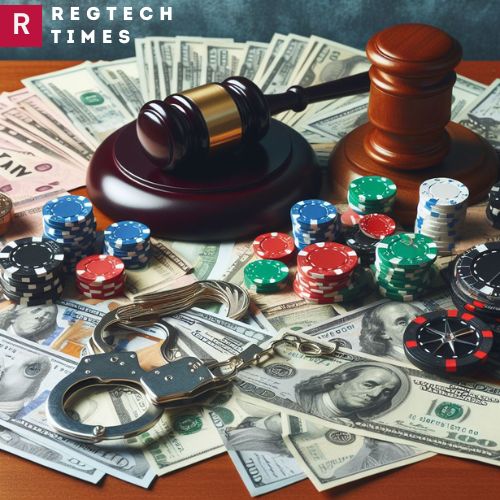Tax offences in the gambling industry pose a substantial challenge to law enforcement and tax authorities globally. The attraction of substantial rewards frequently drives people and organizations to engage in unlawful gambling, evading restrictions and taxation requirements. This illegal activity not only jeopardizes the integrity of legitimate gaming establishments but also poses a significant threat to public revenue and financial institutions. In this context, the interaction of illegal gaming activities and tax evasion schemes is a complicated and diverse issue that necessitates close monitoring and enforcement measures. This introduction investigates the dynamics of tax offences in the gaming industry, including the tactics used, the regulatory landscape, and the ramifications for both criminals and the larger community.
Stephanie Condric’s case exemplifies the complex relationship between unlawful gaming and tax avoidance. Condric, who hails from Ohio, pleaded guilty to conspiring to mislead the IRS, shedding light on the harsh reality of operating outside of authorized gaming frameworks. Her involvement in operating and eventually co-owning Gametastic, an illegal gambling institution in Canton, Ohio, exemplifies the brazen disdain for regulatory compliance and budgetary responsibility that is common in such companies.
Tax Offence by Gametastic- Operations & Evasion
Court documents and testimony revealed that between 2014 and 2018, Stephanie Condric took over and later became a co-owner of Gametastic, an illegal gambling operation in Canton, Ohio. During this time frame, Condric and her co-conspirators planned a purposeful omission in their IRS paperwork, neglecting to reveal the cash wages paid to Gametastic employees. This purposeful evasion of reporting resulted in a considerable underpayment of employment taxes by the business, sustaining the conspiracy to deceive the government.
Furthermore, Condric’s involvement extended beyond the company, as she filed false personal tax forms. These fraudulent filings sought to conceal a significant percentage of Condric’s revenue from her affiliation with Gametastic. By falsifying her tax papers, she exacerbated the fraudulent activity, increasing the IRS’s financial losses and perpetuating the tax offence.
Pending Judgment: Potential Consequences for Condric’s Tax Offence
Stephanie Condric’s sentencing has been postponed pending judicial deliberation. Condric faces up to five years in prison for her role in the conspiracy to defraud the United States. Her sentence may include supervised release, which aims to monitor and encourage her reintegration into society after incarceration. Furthermore, Condric is liable for restitution to compensate for the financial losses inflicted on the government, and he may face monetary fines as further punishment.
A federal district court judge will make the final decision on Condric’s punishment after carefully reviewing the case in light of the United States Sentencing Guidelines and other applicable statutory circumstances. This cautious examination provides a fair and balanced response to Condric’s breaches, weighing the gravity of her offenses against mitigating circumstances and legal precedence.
Joint Announcement by Legal Officials
The official statement was presented jointly by Deputy Assistant Attorney General Stuart M. Goldberg, representing the Justice Department’s Tax Division, and U.S. Attorney Rebecca C. Lutzko for the Northern District of Ohio. Their joint statement emphasized the gravity of the case and the federal authorities’ collaborative efforts to maintain the rule of law and combat financial misconduct and tax offences. As representatives of the justice system, Goldberg and Lutzko presented a message of accountability and reaffirmed their commitment to prosecute those involved in illegal activity, including those who perpetrate tax offences.
Conclusion
The IRS Criminal Investigation, the Stark County Prosecutor’s Office, the Department of Treasury Office of Inspector General, Homeland Security Investigations, the Ohio Casino Control Commission, and the Ohio Organised Crime Investigations Commission-Major Crimes Task Force are all investigating the matter.
The case is being prosecuted by Trial Attorneys Sam Bean and Hayter Whitman of the Tax Division, as well as Assistant US Attorney David Toepfer for the Northern District of Ohio.


